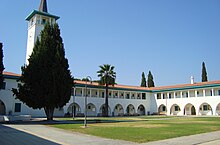University of Cyprus
 | |
| Type | Public |
|---|---|
| Established | 1989 |
| Undergraduates | 6,500 |
| Location | , , |
| Campus | Aglandjia |
| Colors | Yellow |
| Website | www.ucy.ac.cy |
The University of Cyprus (UCY; Greek: Πανεπιστήμιο Κύπρου, Turkish: Kıbrıs Üniversitesi) is a public coeducational university established by the Republic of Cyprus in 1989. It admitted its first students in 1992 and has currently approximately 6000 students (2010/2011).
History
The University of Cyprus was established in 1989 and admitted its first students in 1992. It was founded in response to the growing intellectual needs of the Cypriot people, and is well placed to fulfil several aspirations of the country.
The University is a vigorous community of scholars engaged in the generation and diffusion of knowledge. Despite its brief history, the University of Cyprus has earned the appreciation of Cypriot society. Admission for the majority of undergraduate students is by entrance examinations organised by the Ministry of Education and Culture of the Republic of Cyprus. A number of places are reserved for students with special needs or circumstances. Every effort is made to offer practical solutions to students facing specific problems, be it access to University facilities, or assistance on academic issues. When the University of Cyprus first opened its doors to students, the incoming class consisted of 486 undergraduate students. During the academic year 2010–2011, 4691 undergraduate students attended courses offered by the 21 departments. At the same time, there were 1549 postgraduate students.
Academic profile



Based in the Capital of Cyprus, Nicosia. Teaching is mainly in Greek. The official languages are Greek and Turkish, but only a few Turkish speakers are registered. Since September 2005, the University's credit point system is based on ECTS.
Those eligible to participate in the entrance examination for the University of Cyprus are Cypriot citizens or those with at least one parent of Cypriot origin. Prospective students must have graduated from a six-year high school, and have completed the necessary application forms within the time limits set by the Ministry of Education and Culture. A limited number of positions is granted to the handicapped or those with special needs.
Greeks of the Diaspora and Cypriots who belong to specific religious groups as determined by the constitution of Cyprus, repatriated Cypriots and Cypriots who are permanent residents in the other countries, can claim a limited number of posts (3% of the admitted Cypriot students) based on GCSE/GCE or other equivalent exams.Turkish Cypriots who hold a six-year high-school diploma are eligible for admission upon passing special examinations set by the University.
The programmes of studies at the University of Cyprus are based on credit hours. One credit hour is normally equivalent to one weekly 50-minute «class» per semester. To graduate from the University, a student must successfully complete 120 credit hours as described in the programme of the Department, which must include 12–15 credit hours of free elective courses outside the major area of studies and from at least two faculties of the University. In addition to the 120 credit hours, the student must complete the University's foreign language requirement of 6 to 9 credits.
According to the Webometrics Ranking of World Universities the University of Cyprus ranks 338th in Europe and 830th in the world.[1]
Faculties

There are eight Faculties within the University:
- Faculty of Humanities: three departments and the Language Centre
- Faculty of Pure and Applied Sciences: five departments and the Oceanography Centre,
- Faculty of Social Sciences and Education: four departments and the Centre for Gender Studies
- Faculty of Economics and Management: two departments, the Economic Research Centre and the Centre for Banking and Financial Research
- Faculty of Engineering: four departments, the Nanotechnology Research Centre, KIOS Research Centre for Intelligent Systems and Networks and the NIREAS International Water Research Centre.
- Faculty of Letters: three departments and the Archaeological Research Unit
- Faculty of Graduate Studies
- The Medicine School
Library
The Library has more than 267.289 books,[citation needed] with an annual increase of approximately 12.000 new titles. Important collections among the Library holdings include the Cyprus Studies Collection, Archaeological Collection and Turkish Studies Collection. The majority of books are already catalogued and can be retrieved from the Library Catalogue (ADVANCE/GEAC) from all connected computers within the University network, as well as from anywhere through the Library web-based online public access catalogue (WebOpac). In the last years the University of Cyprus Library has become practically fully electronic (function-wise) and hybrid (content-wise), since its collections include printed, digital and audiovisual material. Furthermore, the Library is capable of producing material in Braille format for visually impaired users.
Research

The University announced in 2012 a 10 MW photovoltaic park and suggested skeleton for a second, equally vast solar park. The University will lead a €1.3 million investigate module into the adoption of net metering. UoC will also lead an EU-funded European investigate module on compelling net metering policies. The Promotion of PV appetite by net metering optimization (PV-NET) devise has a US$1.67 million bill saved by EU by a MED program, that sees 13 EU member states – including all a bloc’s northern Mediterranean member states – operative together on competitiveness and sustainability. Institutions from five countries will join a UoC on a project: Aristotle University, Greece; University of Maribor, Slovenia; Andalusian Energy Institute, Spain; Agency for Energy and Environment in Rhone Alpes, France; and the Agency for Energy and Environment in Algarve, Portugal.[2][3][4]
See also
References
- ^ Webometrics: Ranking Web of Universities
- ^ Cyprus Today: University of Cyprus will lead EU Net Metering research
- ^ Kick off meeting of the PV‐NET project “Promotion of PV energy through net metering optimization”
- ^ Net Metering: A Global Study of Existing Net-‐Metering Practices for Renewable Energy Sources
